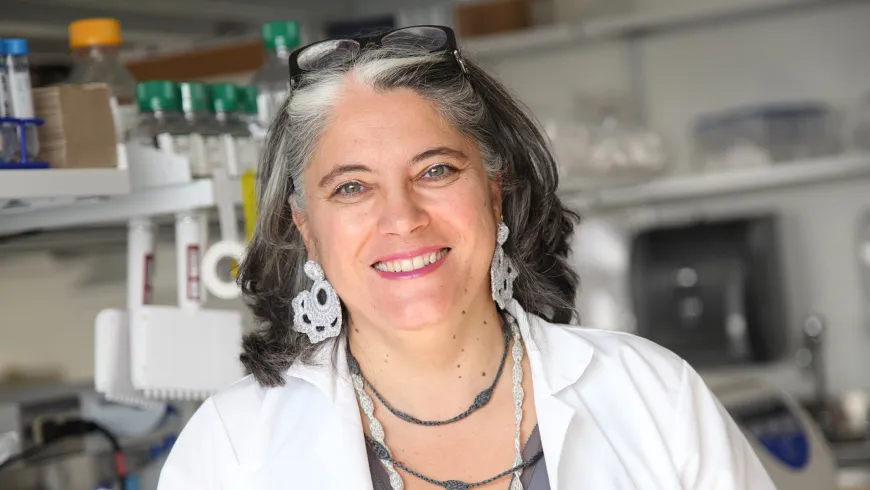The Instituto Franklin de la Universidad de Alcalá grants the VI Camino Real Award to Ana Fernández-Sesma
The researcher and virologist Ana Fernández-Sesma will receive the Camino Real Award from the Instituto Franklin-UAH in a ceremony that will be held in the near future and will take place in the Paraninfo of the Universidad de Alcalá. In this sixth edition, the Advisory Council has agreed, at its regular meeting on June 8th 2023, to grant Ana Fernández-Sesma this award for the development of her scientific work at the Icahn School of Medicine at Mount Sinai in New York (ISMMS) since 1991, and for her position as a world reference for studies related to pathogens that cause infectious diseases. This decision has been ratified by the Academic Council of the Instituto Franklin-UAH at its meeting on June 13th 2023. Her outstanding research in the field of virology and immunology has contributed significantly to the development of effective therapies for the control and eradication of dengue (DENV), influenza (IAV), HIV, and COVID. Her work as a professor is also exemplary and commendable, leading one of the most prestigious and reputable research teams in the field of microbiology and being named in 2013 “Best Mentor for Postdoctoral Fellows” and deserving of the "Award for Teaching Excellence from the Icahn Mount Sinai Institute of Medical Education”.
he Advisory Council of the Instituto Franklin-UAH is constituted by Antonio Vázquez Romero (president), Joaquín Ayuso García (vice president), José Antonio Gurpegui Palacios (secretary), and the members Amalia Blanco Lucas, Claudio Boada Pallerés, Daniel Carreño Álvarez, Ignacio Goirigolzarri Tellaeche, Bernardo Hernández González, Helena Herrero Starkie and Miguel Zugaza Miranda.
The previous recipients of this award are tennis player Rafael Nadal (2022), actor Antonio Banderas (2017), basketball player Pau Gasol (2015), cardiologist Valentín Fuster (2013), and tenor Plácido Domingo (2012).
ANA FERNANDEZ-SESMA
Ana Fernández-Sesma is a PhD in Biomedicine and Professor of Microbiology and Infectious Diseases at the Icahn School of Medicine at Mount Sinai in New York (ISMMS), where she also trains and mentors postgraduate students as Director of PhD Studies in Microbiology. She established her own research group and laboratory at the ISMMS, where she studies how viruses manipulate the human immune system to infect and spread, mainly innate immunity against viruses such as dengue (DENV) and influenza (IAV), among others. Likewise, during the last two years, she has been actively involved in the research and scientific dissemination on SARS-CoV-2, COVID-19, and the importance of vaccination. She has published more than one hundred research and peer-reviewed articles since 1993, and serves on the editorial boards of several research journals and publications as a reviewer and editor, and is affiliated with numerous microbiology and virology associations.
Due to her professional and academic trajectory, she has received different recognitions. In 2013 she was named the Best Faculty Mentor to Postdoctoral Fellows. The Blue Ridge Institute for Medical Research (BRIMR) has highlighted her work as a female investigator in lead microbiology projects funded by the US National Institutes of Health. In 2022 she received the International Award from the Spanish Federation of Directive, Executive, Professional and Entrepreneurial Women (FEDEPE), and she is considered one of the 100 most influential women in Spain in 2022 according to Forbes magazine.
THE CAMINO REAL
The Camino Real Award was established in 2012 coinciding with the 25th anniversary of the creation of the Instituto Franklin-UAH (1987), and as current claim and recognition of the historical Spanish presence in the United States since the arrival of Ponce de Leon to Florida in 1513. The name Camino Real refers to the pathways used by Spaniards to reach the territories that are now part of the United States. The Camino Real de Tierra Adentro (Royal Road of Hinterland) connected along 2,500 km the city of Mexico and Santa Fe, in New Mexico, and the Camino Real of California (originally the Anza route) connected the missions established by the Franciscan Fathers in the Lower and Upper California 1,000 km along the coast.
From its beginnings in the fifteenth century until the early nineteenth century, the California road connected 21 missions and was renamed El Camino Real.
If European culture came to Spain through the Camino de Santiago, the Spanish culture reached the USA through the Camino Real. In 2010, UNESCO declared it a World Heritage Site.
INSTITUTO FRANKLIN-UAH
The Instituto Franklin de la Universidad de Alcalá is the only University Institute for Research on North America in Spain.
Founded in 1987, its activity focuses on postgraduate research and education related to American Studies and Bilingual Education through research projects, scholarships and grants, and its dissemination in own publications and scientific events.
The mission of the Instituto Franklin-UAH is to serve as a platform for communication, cooperation and union between Spain and North America, in order to promote mutual understanding.
To find more information about the Camino Real Award just click here.


